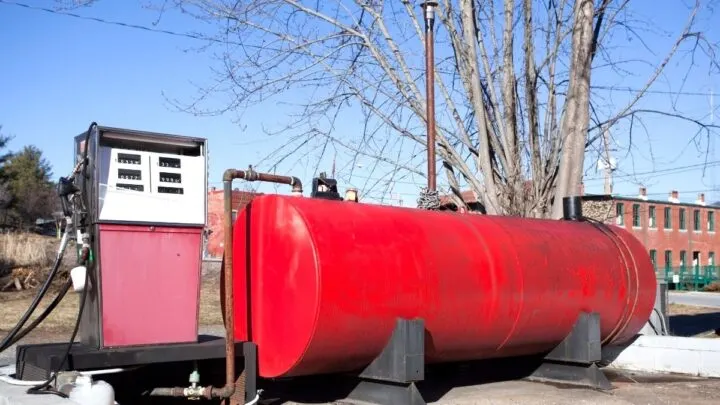If you have any kerosene, I’d be willing to bet that you don’t want it to go bad.
Well, you never want any chemicals or fuel or anything else in your house to go bad, right? Heck, you don’t even want the yogurt you bought at the store the other day to go bad.
But that yogurt is easy to keep track of since it has an expiration date stamped on it. Unfortunately, the kerosene you have is not that simple. Does it even go bad?
Kerosene will start to degrade and break down within 2 to 5 years. If it’s exposed to sunlight and heat, it will not even last that long before going bad.
Kerosene has a limited lifespan, so it’s important to know how long you can store it before it becomes unusable.
In this blog post, we will discuss how long kerosene lasts and what you can do to make sure that it doesn’t go bad.
We’ll also talk about what to do if you accidentally store kerosene for too long or if it does start to go bad.
Finally, we’ll give you some tips on how to safely dispose of kerosene once it’s no longer usable.
How Long Does Kerosene Last?
Synonymous with whether or not kerosene goes bad is how long it will last.
If you have some sitting around the house or out in the garage, you probably don’t want it to go bad, especially since many people aren’t even aware that it can break down over time.
Nothing would be worse than counting on it being there and being ready to use it when you need it, only to find out that it has gone bad.
So how long does kerosene really last?
Kerosene will last for about 2 to 5 years if it is stored properly. After that time, it will start to break down and degrade.
This process is gradual, so you might not notice it right away. However, if you use kerosene that has gone bad, it can be dangerous.
The degradation process can cause the kerosene to produce harmful fumes. These fumes can be toxic and cause respiratory problems. In severe cases, they can even be fatal.
So it’s important to know how long kerosene lasts and to make sure that you store it properly so that it doesn’t go bad.

How Long Can You Store Kerosene?
Now that you have an idea about how long kerosene lasts in general, you might be wondering about how long you can safely store it yourself.
After all, the shelf life of a substance does not always equate to how long a person can reasonably expect to safely store it.
So how long can you store kerosene?
Ideally, you should use kerosene within a year of purchasing it.
However, if you need to store it for longer than that, you can do so as long as you take proper precautions.
When storing kerosene, make sure that you do it properly in order to get the most life out of it and to make sure it hasn’t started to break down before you decide to use it.
Where Should You Store Kerosene?
As mentioned, proper storage of kerosene is arguably the most important aspect of having it on hand. Other than its actual uses of it as fuel oil, you need to know how to store it so that you can get the most out of it.
Thankfully, storing kerosene is not too difficult and doesn’t really require any sort of special storage facility.
So, where should you store kerosene?
The best place to store kerosene is in a cool, dry, and dark area. This could be a closet or cabinet in your home or garage.
You just want to make sure that it is not in direct sunlight and that the temperature is not too hot. If the kerosene is stored in an area that is too hot, it can start to degrade more quickly.
Another important thing to keep in mind when storing kerosene is that you should always keep it in a well-ventilated area.
This is because the fumes from kerosene can be harmful if they are inhaled.
What Happens to Kerosene If It Sits for Too Long?
If you store kerosene for too long, it will start to break down and degrade just like any other chemical or fuel oil. The process is accelerated by heat and light, so it’s important to store kerosene in a cool, dark place.
If you do have kerosene that’s been stored for a long time, it’s best to have it tested by a professional before using it.
Kerosene can go bad, but it doesn’t happen often. If you store kerosene properly, you can expect it to last for years as mentioned above.
But if you do find yourself with kerosene that’s gone bad, there are a few things you can do.
The first thing to do is to dilute the kerosene with fresh kerosene. This will help to reduce the concentration of harmful degradation products in the kerosene.
Next, you’ll want to run the kerosene through a filter.
This will remove any particulates that might be present in the kerosene. Finally, you’ll want to add a fuel stabilizer to the kerosene.
This will help to prevent further degradation and will also help to improve the performance of the kerosene.
Once you’ve done all of these things, you should be able to safely use the kerosene. However, if you’re still not sure, it’s always best to err on the side of caution and dispose of it properly.
How Do You Get Rid of Kerosene That’s Gone Bad?
So, what happens if you have had your kerosene for too long and it’s gone bad?
Due to the potential harmfulness of kerosene, you will want to make sure that you dispose of it properly.
We have a separate article on the site completely dedicated to safely disposing of old kerosene, so we’ll spare you some of the details here.
In short, the best way to dispose of kerosene is to take it to your local hazardous waste disposal facility. You can find the nearest one to you by visiting Earth911.com.
Once you’re there, they will be able to properly dispose of the kerosene for you.
You can also try letting it evaporate, but as we explain in another article, this process will take a very long time and should only be used as a last resort for small amounts.
The biggest thing to avoid is just pouring it down the drain or burying it, since this can be harmful to the environment.
Summing Up If Kerosene Goes Bad
Just like any other chemical, kerosene will start to break down and eventually become unusable or dangerous over time.
For kerosene, it’s best to use it within 2 to 5 years of when you purchase it.
Make sure it’s stored in a cool and dark place to ensure its longevity as well.


